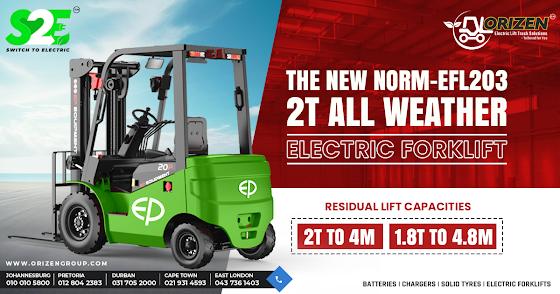Top Reasons to Convert Diesel Forklifts to Electric for Your Warehouse Business
As South Africa continues to grow as an industrial hub, many warehouse businesses are increasingly focusing on improving efficiency, reducing costs, and adopting more sustainable practices. One significant shift in recent years has been the conversion from diesel-powered forklifts to electric forklift. With environmental concerns and economic pressures at the forefront of business strategies, it makes sense to explore the reasons why converting diesel forklifts to electric forklift is not only a smart business decision but also an environmentally responsible choice in the South African context.
Electric Forklift Comes with Lower Operating Costs
Operating a diesel forklift can be expensive due to the
rising costs of fuel, frequent maintenance, and potential repairs. In country
like South Africa, where fuel prices are volatile and sometimes unpredictable,
relying on diesel-powered forklifts can result in fluctuating and higher
operational expenses. By converting to electric forklifts, businesses can
significantly reduce fuel costs and take advantage of more predictable
electricity prices. Additionally, electric forklifts have fewer moving parts and
require less maintenance, resulting in long-term cost savings and reduced
downtime due to fewer mechanical issues.
Electric Forklift Gives Environmental Benefits
As climate change becomes an increasingly urgent issue
worldwide, South Africa is taking steps to reduce its carbon footprint. By
2050, the country aims to be net carbon neutral, which makes reducing emissions
from industries crucial. Diesel forklifts release harmful pollutants such as
carbon dioxide (CO2) and nitrogen oxides (NOx), which contribute to air
pollution and global warming. In contrast, electric forklifts produce zero
emissions, helping businesses in South Africa contribute to cleaner air, reduce
their environmental impact, and align with national sustainability targets.
For companies looking to operate more sustainably and meet
environmental regulations, the shift to electric forklifts is a clear step in
the right direction.
Electric Forklift Improve Indoor Air Quality
In many warehouses and distribution centers in South Africa,
diesel forklifts are often used in confined or indoor spaces. The emissions
from diesel engines can negatively affect indoor air quality, posing health
risks to employees. In an industrial setting, where workers may spend long
hours operating forklifts, exposure to harmful diesel fumes can lead to
respiratory issues, fatigue, and other health complications. By switching to electric forklifts, businesses can eliminate these
risks, improve indoor air quality, and create a healthier work environment for
their employees. This is especially important in South Africa, where workplace
safety regulations are becoming more stringent, and companies are being
encouraged to prioritize worker health and well-being.
Electric Forklift Enhanced Performance and Reliability
Electric forklifts are known for their superior performance
and reliability, making them an ideal choice for warehouse businesses in South
Africa. Unlike their diesel counterparts, electric forklifts are quieter,
offering a more comfortable and less disruptive working environment. The smooth
operation of electric forklifts also contributes to higher productivity, as
they can accelerate faster and handle heavier loads more efficiently. With
their lower maintenance requirements and fewer mechanical parts, electric
forklifts provide more reliable service, which can significantly reduce the
risk of unexpected breakdowns and associated costs.
Electric Forklift Contributing to a Sustainable Future in
South Africa
South Africa has become increasingly committed to
environmental sustainability, with many industries seeking to reduce their
carbon footprints and embrace renewable energy solutions. The shift from diesel
to electric forklifts plays an important role in this movement. By adopting
cleaner technologies, businesses in South Africa can contribute to the
country’s green growth and demonstrate their commitment to sustainability.
Furthermore, such investments can improve corporate social responsibility (CSR)
credentials, attract eco-conscious customers, and enhance a brand’s reputation
both locally and globally.



Comments
Post a Comment